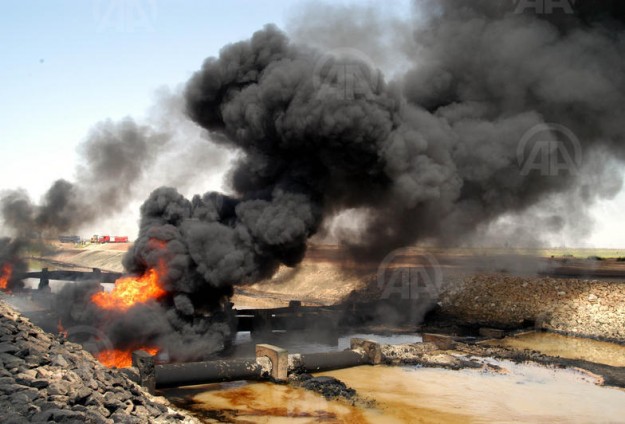Jihadi sources in the Caucasus claim Thursday that the Islamic State of Iraq and Ash Sham are behind an explosion that hit an oil pipeline in the northern Iraqi city of Mosul on September 28.
The explosion halted the transfer of oil from the Kirkuk- Yumurtalik pipeline between Iraq and Turkey’s Mediterranean coast. Turkey’s Andolu agency reported that Iraqi security forces had found two bodies near the blast site, thought to be those who carried out the bombing.
The blast and the subsequent fire halted the oil transfer through the pipeline.
It is not possible to verify the veracity of the claim that ISIS were responsible for the attack, which local news reports initially suggested was sabotage by the Turkish PKK, who have been blamed for previous attacks on the Turkish section of the pipeline. The pipeline has been subjected to a series of blasts, the last in August.
Jihadist site Umma News reports that ISIS was also responsible for a suicide bombing a day earlier.
Umma News reported that the attack had been a “special operation to eliminate the so-called high-ranking officer of the Federal Police, whose motorcade drove through the Al Kayyara in the south of the city.” The report said that an explosive-laden truck had been remotely detonated near the motorcade, killing the leader — named as Colonel Mahdi Muhammad Faraj — instantly, and injuring seven other police officers.
The same source said that ISIS were also responsible for the shooting of another police officer in the former insurgent stronghold of Hawija, 240 kilometres (150 miles) north of Baghdad.
CNN reported on September 27 that Col. Ghazi Ahmed had been shot dead after gunmen stormed his house. Jihadist sources said that Ahmed had been a “senior security official of the Shia regime”.
ISIS also claimed responsibility, according to the source, for a roadside bomb attack that injured Haider Sami, a senior Army officer in the third regiment in Nineveh.
There is no way of independently verifying the claims that ISIS were responsible for the attacks.

